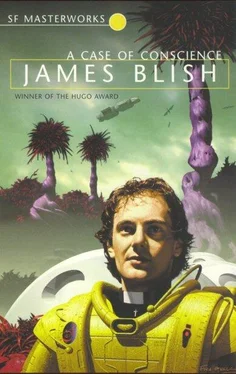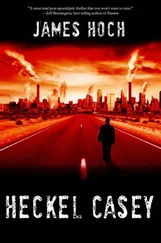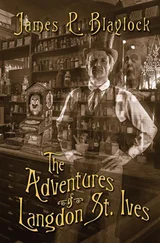Agronski went out, and, maddeningly, so did Michelis- at least out of Cleaver’s field of vision. Setting his every muscle against the pain, Cleaver pulled his lips apart once more.
“Mike.”
Instantly, Michelis was there. He had a pad of cotton between thumb and forefinger, wet with some solution, with which he gently cleaned Cleaver’s lips and chin.
“Easy. Agronski’s getting you a drink. We’ll let you talk in a little while, Paul. Don’t rush it.”
Cleaver relaxed a little. He could trust Michelis. Nevertheless, the vivid and absurd insult of having to be swabbed like a baby was more than he could bear; he felt tears of helpless rage swelling on either side of his nose. With two deft, non-committal swipes, Michelis removed them.
Agronski came back, holding out one hand tentatively, palm up.
“I found these,” he said. “There’s more in the lab, and the Father’s pill press is still out. So are his mortar and pestle, though they’ve been cleaned.”
“All right, let’s have ’em,” Michelis said. “Anything else?”
“No. Well, there’s a syringe cooking in the sterilizer, if that means anything.”
Michelis swore briefly and to the point.
“It means that there’s a pertinent antitoxin in the shop someplace,” he added. “But unless Ramon left notes, we’ll not have a prayer of figuring out which one it is.”
As he spoke, he lifted Cleaver’s head and tipped the pills into his mouth, onto his tongue. The water which followed was cold at the first contact, but a split second later it was liquid fire. Cleaver choked, and at that precise instant Michelis pinched his nostrils shut. The pills went down with a gulp.
“There’s no sign of the Father?” Michelis said.
“Not a one, Mike. Everything’s in good order, and his gear’s still here. Both jungle suits are in the locker.”
“Maybe he went visiting,” Michelis said thoughtfully. “He must have gotten to know quite a few of the Lithians by now. He liked them.”
“With a sick man on his hands? That’s not like him, Mike. Not unless there was some kind of emergency. Or maybe he went on a routine errand, expected to be back in just a few minutes, and-”
“And was set upon by trolls, for forgetting to stamp his foot three times before crossing a bridge.”
“All right, laugh.”
“I’m not laughing, believe me. That’s just the kind of damn fool thing that can kill a man in a strange culture. But somehow I can’t see it happening to Ramon.”
“Mike…”
Michelis took a step and looked down at Cleaver. His face was drifting as if detached through a haze of tears. He said: “All right, Paul. Tell us what it is. We’re listening.”
But it was too late. The doubled sedative dose had gotten to Cleaver first. He could only shake his head, and with the motion Michelis seemed to go reeling away into a whirlpool of fuzzy rainbows.
Curiously, he did not quite go to sleep. He had had nearly a normal night’s sleep, and he had started out his enormously long day a powerful and healthy man. The conversation of the two commissioners, and an obsessive consciousness of his need to speak to them before Ruiz-Sanchez returned, helped to keep him, if not totally awake, at least not far below a state of light trance. In addition, the presence in his system of thirty grains of acetylsalicylic acid had seriously raised his oxygen consumption, bringing with it not only dizziness but also a precarious, emotionally untethered alertness. That the fuel which was being burned to maintain it was in part the protein substrate of his own cells he did not know, and it could not have alarmed him had he known it. The voices continued to reach him, and to convey a little meaning. With them were mixed fleeting, fragmentary dreams, so slightly removed from the surface of his waking life as to seem peculiarly real, yet at the same time peculiarly pointless and depressing. In the semiconscious intervals there came plans, a whole succession of them, all simple and grandiose at once, for taking command of the expedition, for communicating with the authorities on Earth, for bringing forward secret papers proving that Lithia was uninhabitable, for digging a tunnel under Mexico to Peru, for detonating Lithia in one single mighty fusion of all its lightweight atoms into one single atom of cleaverium, the element of which the monobloc had been made, whose cardinal number was Aleph-Null…
AGRONSKI: Mike, come here and look at this; you read Lithian.
There’s a mark on the front door, on the message tablet.
(Footsteps.)
MICHELIS: It says “Sickness inside.” The strokes aren’t casual or deft enough to be the work of the natives. Ideograms are hard to write rapidly without long practice. Ramon must have written it there.
AGRONSKI: I wish we knew where he went afterwards. Funny we didn’t see it when we came in.
MICHELIS: I don’t think so. It was dark, and we weren’t looking for it.
(Footsteps. Door shutting, not loudly. Footsteps. Hassock creaking.)
AGRONSKI: Well, we’d better start thinking about getting up a report. Unless this damn twenty-hour day has me thrown completely off, our time’s just about up. Are you still set on opening up the planet?
MICHELIS: Yes. I’ve seen nothing to convince me that there’s anything on Lithia that’s dangerous to us. Except maybe Cleaver in there, and I’m not prepared to say that the Father would have left him if he were in any serious danger. And I don’t see how Earthmen could harm this society; it’s too stable emotionally, economically, in every other way.
(Danger, danger, said somebody in Cleaver’s dream. It will explode. It’s all a popish plot. Then he was marginally awake again, and conscious of how much his mouth hurt.)
AGRONSKI: Why do you suppose those two jokers never called us after we went north?
MICHELIS: I don’t have any answer. I won’t even guess until I talk to Ramon. Or until Paul’s able to sit up and take notice.
AGRONSKI: I don’t like it, Mike. It smells bad to me. This town’s right at the heart of the communications system of the planet-that’s why we picked it, for Crisake! And yet-no messages, Cleaver sick, the Father not here… There’s a hell of a lot we don’t know about Lithia, that’s for damn sure.
MICHELIS: There’s a hell of a lot we don’t know about central Brazil-let alone Mars, or the Moon.
AORONSKI: Nothing essential, Mike. What we know about the periphery of Brazil gives us all the clues we need about the interior-even to those fish that eat people, the what-are-they, the piranhas. That’s not true on Lithia. We don’t know whether our peripheral clues about Lithia are germane or just incidental. Something enormous could be hidden under the surface without our being able to detect it.
MICHELIS: Agronski, stop sounding like a Sunday supplement. You underestimate your own intelligence. What kind of enormous secret could that be? That the Lithians eat people? That they’re cattle for unknown gods that live in the jungle? That they’re actually mind-wrenching, soul-twisting, heart-stopping, blood-freezing, bowel-moving superbeings in disguise? The moment you state any such proposition, you’ll deflate it yourself; it’s only in the abstract that it’s able to scare you. I wouldn’t even take the trouble of examining it, or discussing how we might meet it if it were true.
AORONSKI: All right, all right. I’ll reserve judgment for the time being, anyhow. If everything turns out to be all right here, with the Father and Cleaver I mean, I’ll probably go along with you. I don’t have any reason I could defend for voting against the planet, I admit that.
MICHELIS: Good for you. I’m sure Ramon is for opening it up, so that should make it unanimous. I can’t see why Cleaver would object.
Читать дальше











